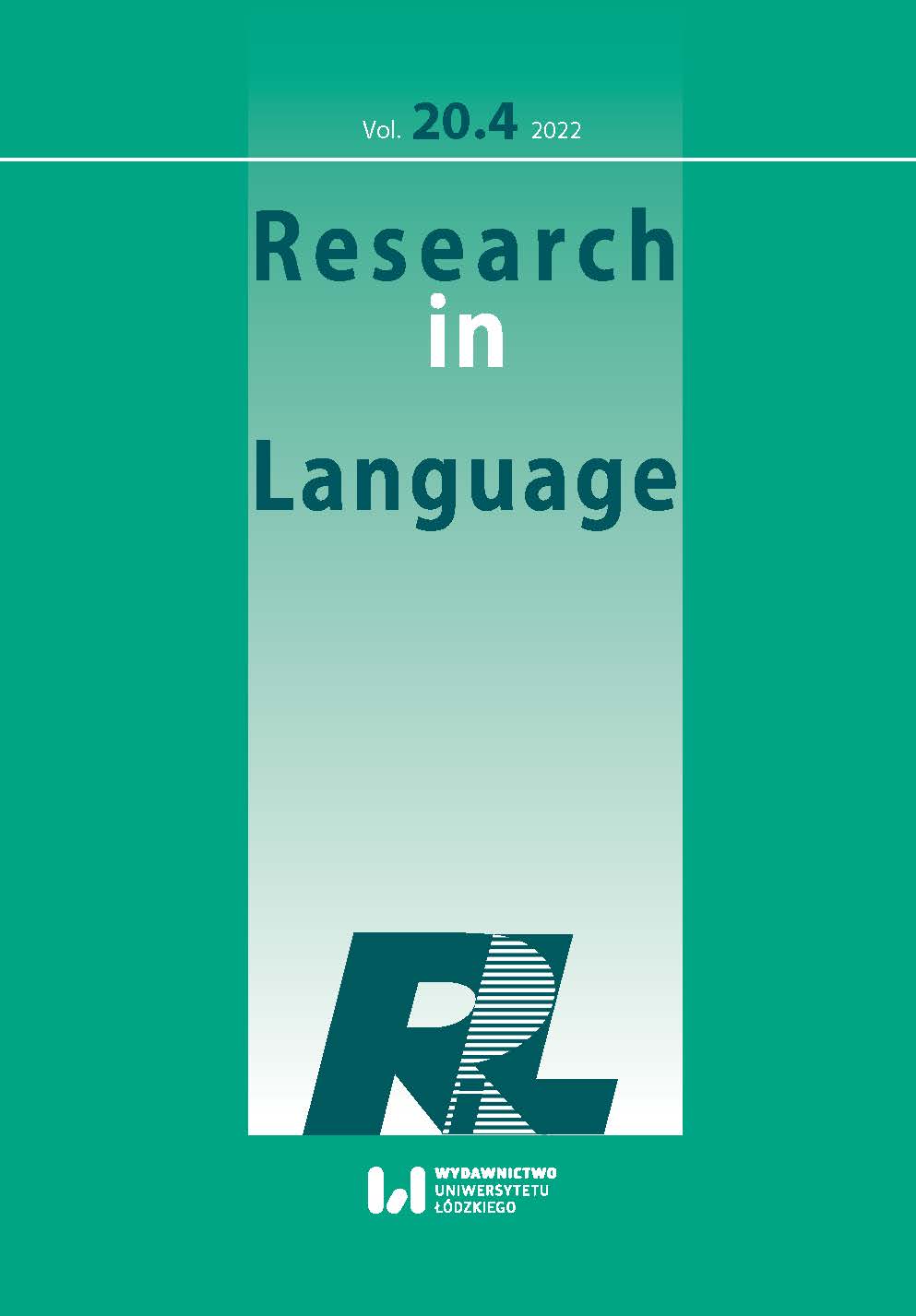The influence of Latin on Old English adjectival postposition
DOI:
https://doi.org/10.18778/1731-7533.20.4.03Keywords:
Old English, syntax, corpus linguistics, LatinAbstract
The article is a systematic, corpus-based account of Latin’s influence on the position of Old English (OE) adnominal adjectives. While multiple studies on phrase-level syntax suggest that source-text interference may have been partly responsible for placing the adjective after the head noun, this observation has so far received little quantitative underpinning. The present article offers a detailed comparison of OE target noun phrases containing postnominal adjectives with their Latin counterparts to determine the exact extent to which this arrangement may have been a syntactic calque from a foreign language. The study has found that while a fair number of OE postposed adjectives did copy their Latin originals, their placement could be accounted for through reference to tendencies characteristic of OE (i.e. the adjective displays different degrees of “verbalness” or is part of a heavy phrase). Therefore, it appears that translated texts do not have to be excluded or treated with particular suspicion in studies concerned with the position of adnominal adjectives.
References
Bartnik, A. (2009). Noun Phrase structure in Old English. Quantifiers and other functional categories. Lublin: Wydawnictwo KUL.
Google Scholar
Cameron, M. (1983). Bald's Leechbook: Its Sources and Their Use in its Compilation. Anglo-Saxon England, 12, 153-182. https://doi.org/10.1017/S0263675100003392
Google Scholar
DOI: https://doi.org/10.1017/S0263675100003392
Cichosz, A., Gaszewski, J., and Pęzik, P. (2016). Element Order in Old English and Old High German Translations. Amsterdam/Philadelphia: Benjamins. https://doi.org/10.1075/nss.28
Google Scholar
DOI: https://doi.org/10.1075/nss.28
Cichosz, A., Gaszewski, J, Pęzik, P., and Grabski, M. (2014). Old English – Old High German – Latin Corpus (ENHIGLA). University of Łódź available online at http://pelcra.pl/enhigla/corpus
Google Scholar
Crisma, P. (1999). Nominals without the article in the Germanic Languages. Rivista di Grammatica Generativa, 24, 105–25.
Google Scholar
Fischer, O. (2012). The status of the postponed 'and-adjective'construction in Old English: Attributive or predicative? In D. Denison, R. Bermúdez-Otero, C. McCully, and E. Moore (eds.), Analysing Older English (Studies in English Language) (251-284). Cambridge: Cambridge University Press. https://doi.org/10.1017/CBO9781139022170.023
Google Scholar
DOI: https://doi.org/10.1017/CBO9781139022170.023
Fischer, Olga. (2004). Developments in the category adjective from Old to Middle English. Studies in Medieval Language and Literature 19. 1-36.
Google Scholar
Fischer, O. (2001). The position of the adjective in (old) English from an iconic perspective. In O. Fischer and M. Nänny (eds.), The Motivated Sign (249-276). Amsterdam/Philadelphia: John Benjamins. https://doi.org/10.1075/ill.2.19fis
Google Scholar
DOI: https://doi.org/10.1075/ill.2.19fis
Fischer, O. (2000). The position of the adjective in Old English. In R. Bermudez-Otero et al. (eds), Generative Theory and Corpus Studies. A Dialogue from 10 ICEHL (153-182). Berlin: Mouton de Gruyter. https://doi.org/10.1515/9783110814699.153
Google Scholar
DOI: https://doi.org/10.1515/9783110814699.153
Fischer, O. (1992). Syntax. In N. Blake (ed.), The Cambridge History of the English Language, Vol. 2: 1066-1466 (207-408). Cambridge: Cambridge University Press.
Google Scholar
DOI: https://doi.org/10.1017/CHOL9780521264754.005
Fischer, O., van Kemenade, A., Koopman, W., and van der Wurff, W. (2000). The Syntax of Early English. Cambridge: Cambridge University Press. https://doi.org/10.1017/CBO9780511612312
Google Scholar
DOI: https://doi.org/10.1017/CBO9780511612312
Fischer, O and van der Wurff, W. (2006). Syntax. In R. Hogg and D. Denison (eds.), A History of the English Language (109-198). Cambridge: Cambridge University Press. https://doi.org/10.1017/CBO9780511791154.004
Google Scholar
DOI: https://doi.org/10.1017/CBO9780511791154.004
Haumann, D. (2010). Adnominal adjectives in Old English. English Language and Linguistics, 14, 53-81. https://doi.org/10.1017/S1360674309990347
Google Scholar
DOI: https://doi.org/10.1017/S1360674309990347
Haumann, D. (2003). The postnominal 'and adjective' construction in Old English. English Language and Linguistics, 7(1), 57-83. https://doi.org/10.1017/S1360674303211011
Google Scholar
DOI: https://doi.org/10.1017/S1360674303211011
Hill, J. (2009). Aelfric: his life and works. In Hugh Magennis and Mary Swan (eds.), A companion to Ælfric. Leiden, NL: Brill, 35-66. https://doi.org/10.1163/ej.9789004176812.i-468.14
Google Scholar
DOI: https://doi.org/10.1163/ej.9789004176812.i-468.14
Irvine, S. (2012). Beginnings and transitions: Old English. In L. Mugglestone, (ed.), The Oxford History of English. Oxford: Oxford University Press, 39-74.
Google Scholar
Pysz, A. (2009). The Syntax of Prenominal and Postnominal Adjectives in Old English. Cambridge: Cambridge Scholars.
Google Scholar
Randall, B., Kroch, A., and Taylor, A. (2005-2013). CorpusSearch2. Available online at http://corpussearch.sourceforge.net/CS.html
Google Scholar
Raumolin-Brunberg, H. (1994). The position of adjectival modifiers in Late Middle English noun phrases. In U. Fries, G. Tottie, and P. Schneider (eds.), Creating and Using English Language Corpora. Papers from the Fourteenth International Conference on English Language Research on Computerized Corpora, Zurich 1993 (159-168). Amsterdam: Rodopi.
Google Scholar
Ringe, D and Taylor, A. (2014). The Development of Old English. Oxford: Oxford University Press. https://doi.org/10.1093/acprof:oso/9780199207848.001.0001
Google Scholar
DOI: https://doi.org/10.1093/acprof:oso/9780199207848.001.0001
Sampson, S. A. (2010). Noun Phrase Word Order Variation in Old English Verse and Prose. Unpublished Ph.D. Dissertation. Ohio State University.
Google Scholar
Spamer, J. (1979). The development of the definite article in English: A case study of syntactic change. Glossa, 13, 241–250.
Google Scholar
Stanton, R. (2002). The Culture of Translation in Anglo-Saxon England. Cambridge: D.S. Brewer.
Google Scholar
Taylor, Ann, Warner, A., Pintzuk, S., and Beths, F. (2003). The York-Toronto-Helsinki Parsed Corpus of Old English Prose (YCOE). Department of Linguistics, University of York. Oxford Text Archive (available online at http://www-users.york.ac.uk/~lang22/YcoeHome1.htm
Google Scholar
The Old English History of the World – Malcolm R. Godden | Harvard University Press. (n.d.). Retrieved from http://www.hup.harvard.edu/catalog.php?isbn=9780674971066
Google Scholar
Timofeeva, O. (2010). Non-finite Constructions in Old English, with Special Reference to Syntactic Borrowing from Latin. Helsinki: Mémoires de la Société Néophilologique de Helsinki.
Google Scholar
Trips, C. (2015). English Syntax in Three Dimensions. Berlin/Boston: De Gruyter. https://doi.org/10.1515/9783110290097
Google Scholar
DOI: https://doi.org/10.1515/9783110290097
Vendler, Z. (1967). The Grammar of Goodness. In Z. Vendler (ed.), Linguistics in Philosophy (172-195). Ithaca: Cornell University Press. https://doi.org/10.7591/9781501743726
Google Scholar
DOI: https://doi.org/10.7591/9781501743726
Downloads
Published
How to Cite
Issue
Section
License

This work is licensed under a Creative Commons Attribution-NonCommercial-NoDerivatives 4.0 International License.










